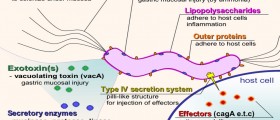
People who have very severe ulcers usually experience a great amount of pain and are unable to sleep.
Ulcers can negatively affect the quality life of the people who have them.
Peptic ulcers can be even more serious if they continue to progress and end up hemorrhaging or perforating the stomach or duodenum. Of everyone who suffers from some kind of ulcer, about 15 percent experience bleeding, which can be life threatening in many cases.
When an ulcer forms in the area joining the small intestine and the stomach, there can be swelling and scaring and the intestinal opening will become smaller. One symptom of this is constantly vomiting the entire contents of the stomach and in such a case, emergency medical attention is absolutely necessary.
Some 6,500 die each year from complications that arise from peptic ulcers.
Ulcers that are caused by people overusing anti-inflammatory drugs (NSAIDs) are much more likely to result in bleeding than those that are bacteria related.
NSAID-related bleeding from the stomach result in about 16,500 deaths every year.
It is very hard, almost impossible, to predict whether severe damage is being done by the drugs because there are hardly any noticeable symptoms before the stomach actually begins bleeding.
When the ulcer is the result of H. pylori bacteria, it is often linked to cancer, even though the evidence supporting this claim is not very solid.
It is also fairly interesting that people with duodenal ulcers that are caused by the H. pylori bacteria appear to have a much smaller risk of stomach cancer, but scientists are not sure what the reason for this is actually. It could be the fact that there is a high level of acids affecting the duodenum, which probably helps to prevent the spread of the bacteria to the most vital areas of the stomach.
H. pylori has also been linked to pancreatic cancer, heart disease and coronary artery disease.
In addition, the bacteria often cause non-intestinal or digestive disorders, and sometimes can even cause migraine headaches and skin disorders such as chronic hives.
Still, the bacteria are most commonly associated with stomach cancer. In countries where the rate of the H. pylori is much higher than in America, there are up to six times more cases of stomach cancer, which is a telling statistic related to the bacteria’s involvement with the cancer and the high risks that come from the bacteria being present in the body at high levels.

















Your thoughts on this
Loading...